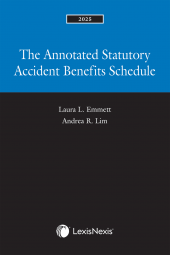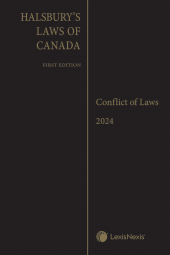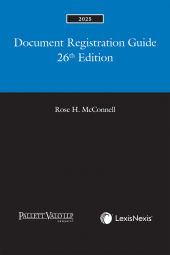The Law of Investigative Detention, 2nd Edition
This book, unlike any other criminal law textbook, provides a comprehensive legal analysis of the doctrine, covering every significant aspect, from the types of investigative detention, to the ways in which it can be challenged (or upheld).
One Year Subscription Only Terms
Subscribers receive the product(s) listed on the Order Form and any Updates made available during the annual subscription period. Shipping and handling fees are not included in the annual price.
Subscribers are advised of the number of Updates that were made to the particular publication the prior year. The number of Updates may vary due to developments in the law and other publishing issues, but subscribers may use this as a rough estimate of future shipments. Subscribers may call Customer Support at 800-833-9844 for additional information.
Subscribers may cancel this subscription by: calling Customer Support at 800-833-9844; emailing customer.support@lexisnexis.com; or returning the invoice marked 'CANCEL'.
If subscribers cancel within 30 days after the product is ordered or received and return the product at their expense, then they will receive a full credit of the price for the annual subscription.
If subscribers cancel between 31 and 60 days after the invoice date and return the product at their expense, then they will receive a 5/6th credit of the price for the annual subscription. No credit will be given for cancellations more than 60 days after the invoice date. To receive any credit, subscriber must return all product(s) shipped during the year at their expense within the applicable cancellation period listed above.
Product description
The body of law surrounding investigative detention continues to grow, and this practical textbook, now in its second edition, contains the latest developments in the law, as seen from three recent Supreme Court of Canada cases. Written by a thirty-year veteran lawyer who has argued cases for both the Crown and defence, this book, unlike any other criminal law textbook, provides a comprehensive legal analysis of the doctrine, covering every significant aspect, from the types of investigative detention, to the ways in which it can be challenged (or upheld). This useful guide provides a "roadmap" for any criminal law practitioner whose clients have been in - or are about to face - investigative detention.
What's New in This Edition
- Examines three recent Supreme Court of Canada cases, R. v. Grant, R. v. Suberu and R. v. Nolet, covering fundamental issues such as:
- When a detained person is entitled to the right to counsel
- Exclusion of evidence
- How the doctrine applies - and is developing - with respect to detentions that occur at commercial vehicle stops
- Whether a detention can be based on a "suspected" offence rather than a "known" offence
- Relationship of an investigative detention to a subsequent deployment of a detector dog
- New coverage of case law concerning motor vehicle detention legislation under various provincial Highway Traffic acts
- Updated annotations and citations for related cases under each subject area; serves as an excellent starting point for further research in this area of law
Book Features
- Rather than just focusing on the theoretical aspects of investigative detention, this book takes a practical approach, and teaches lawyers what to do in the event their clients face investigative detention
- Covers all the different types of investigative detention: physical, psychological, motor vehicle stops
- Looks at issues that flow from an investigative detention, such as the infringement of Charter rights, search and seizure, and resisting unlawful detention
- Discusses the ways in which investigative detentions can be challenged (or upheld)
- Civil remedies for investigative detentions
- Suggestions for reform of the law of investigative detention
Who Should Read This Book
- Criminal law practitioners - Helps lawyers argue cases involving investigative detentions, and provides the most recent updates in the law
- Paralegals and clerks - Useful guide when dealing with investigative detentions in the context of motor vehicle offenses
- Crown prosecutors - Discusses the ways in which investigative detention can be attacked (or legally justified)
- Judges - Informs judges of all key issues whenever ruling on cases involving investigative detention
Table of contents
Chapter 1: Investigative Detention
1.1 Introduction – History, Development and Critiques of the Investigative Detention Doctrine
1.2 Types of Detention
1.3 Motor Vehicle Stops
1.4 Case Law – The Common Law Detention Criteria Considered
1.5 Charter Rights in Investigative Detention – Sections 7, 8, 9, 10(a) and 10(b)
1.6 Search and Seizure Incident to Investigative Detention
1.7 Resisting an Unlawful Detention
Chapter 2: Exclusion of Evidence
Chapter 3: Challenging an Investigative Detention – Evidentiary and Practical Issues
Chapter 4: Civil Remedies
Chapter 5: Reforming Investigative Detention
Chapter 6: Conclusion
Appendix A – Provincial Highway Legislation Authorizing Peace Officers to Stop Vehicles
Appendix B – Police and Criminal Evidence Act and Code A
Related products
-
New!Preorder
 The Annotated Statutory Accident Benefits Schedule, 2025 EditionNew!Release date: November 29, 2024$200.00
The Annotated Statutory Accident Benefits Schedule, 2025 EditionNew!Release date: November 29, 2024$200.00 -
New!Preorder
 Halsbury's Laws of Canada – Conflict of Laws (2024 Reissue)New!Release date: November 29, 2024$335.00
Halsbury's Laws of Canada – Conflict of Laws (2024 Reissue)New!Release date: November 29, 2024$335.00 -
New!Preorder
 Document Registration Guide, 26th Edition, 2025New!Release date: November 29, 2024$240.00
Document Registration Guide, 26th Edition, 2025New!Release date: November 29, 2024$240.00
 Lexis Nexis
Lexis Nexis 
